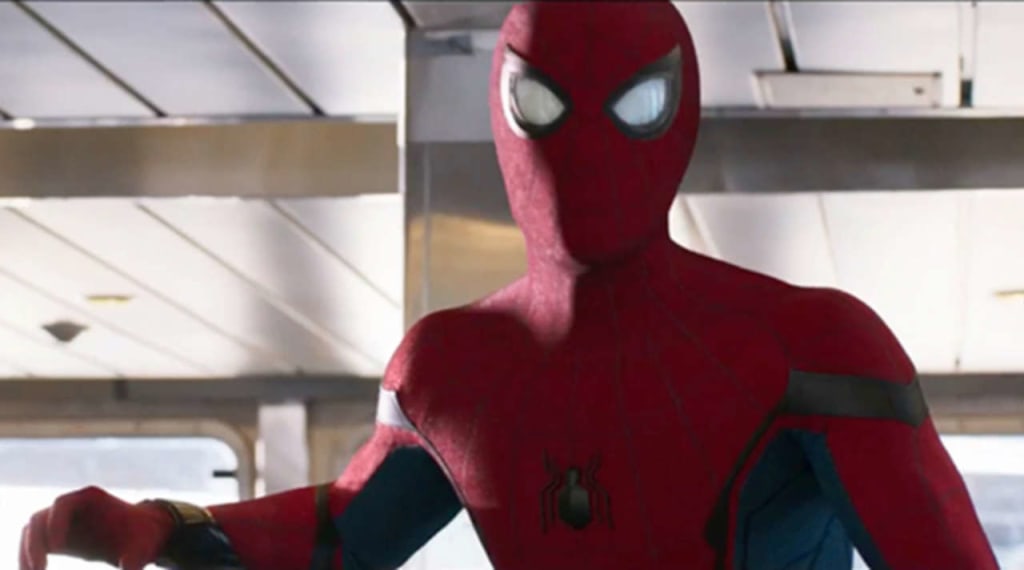
There's a powerful scene partway through Spider-Man: Homecoming in which Tom Holland's #SpiderMan is confronted by Robert Downey Jr.'s Tony Stark. As the trailer already revealed, Spider-Man's ill-thought-through acts of heroism have put lives in jeopardy, and Stark is furious at having to step in to help the Staten Island Ferry disaster. A chagrined Peter Parker desperately tells Tony that he just wanted to be like him; Stark's retort is as accurate as a sniper's bullet. "I wanted you to be better."
Fortunately though, Spider-Man has proved that he is better by the film's end. Not only has he managed to steer a plummeting plane to safety and prevent the loss of innocent lives, but Peter has also proven himself to be a very different hero to Tony Stark.
The following article contains spoilers for Spider-Man: Homecoming
A New Kind of Superhero
In a bizarre way, audiences are starting to get used to the idea of superheroes actually killing people. Over in the DCEU, this has been a matter of real controversy — Some fans were outraged when Superman snapped Zod's neck in Man of Steel, while Batman's use of lethal force in Batman v Superman: Dawn of Justice left fans reeling as the 'no-kill' rule was disavowed.
Marvel's heroes are, surprisingly enough, no different. Captain America is a soldier first and foremost who's no stranger to warzones. In Captain America: Winter Soldier, he literally brings down three helicarriers without a qualm. Iron Man is a weapons designer who launches his superhero career blowing up tanks. Nowhere is this signposted more effectively than in Iron Man 3, when Stark fumes:
"You broke my friend's little sister's plastic watch. You know what? You die first."
Spider-Man is different. He's no soldier, he's no warrior. Instead, he's a defender and a protector. Peter will break away from a battle with heavily-armed goons to rescue a friend (and a cat) from a burning building. Not only will he avoid using lethal force, Spidey will actually apologize if he feels that he hit the bad guy a little too hard!
In the most telling scene of all, the film ends with Adrian Toomes's wings exploding — but Spider-Man won't even leave a supervillain to die. Peter plunges into the flames, not knowing whether or not anything in those Stark crates is ready to explode. It doesn't matter to Peter Parker that the Vulture knows his secret identity, and has threatened everyone that he loves. No, Spider-Man still won't leave a man to die. This is the mark of a very different kind of hero.
Signposted Through the Film
This theme is signposted throughout the film thanks to how the artifical intelligence contained in Spider-Man suit's repeatedly suggests using a kill mode. Peter is consistently horrified at Karen's idea, rejecting it outright. What's even more disturbing about this is when you consider that Tony Stark deliberately designed a costume for a fifteen-year-old that had a kill mode. Sure, it was deactivated as part of the 'Training Wheels' protocol, but the fact remains that Stark automatically thought of installing a kill mode.
By rejecting the kill mode, and by refusing to let even his nemesis die, Peter Parker signals that he is a very different kind of superhero. For all his excitement and exuberance, Spider-Man is a hero because he wants to make a difference, because he wants to save lives.
It's a brilliant detail, and so very true to the comics. This has been a recurring theme over the decades, with Spider-Man inspired by his uncle's death and those famous words: "With great power comes great responsibility." During Dan Slott's ongoing run, there was even a period where he vowed that nobody would die while he was around.
A Believer in Redemption
The fundamental difference between Spider-Man and other heroes is this — He believes nobody is beyond redemption. Peter will strive to save every single person, never once asking whether or not they're worthy of a superhero risking his life on their behalf. Spidey looks at even the worst of us, and fundamentally believes we are worth it.
That's most visible at the film's end. Notice that Peter isn't even tempted to let the Vulture die; he reacts instinctively, refusing to give up on even his worst enemy, the villain who has threatened everything he loves. And, in a beautiful touch, the mid-credit scene hints that his example has inspired the Vulture. When asked if he knows Spider-Man's secret identity, the Vulture refuses to give it up. Spider-Man's belief in him has created a strange bond of honor between the two that has the potential to create a fascinating impact on the future of the #MCU.
"I wanted you to be better," Tony Stark said. Well, here's the truth; Peter Parker already was better, and by the end of Homecoming, he's proven it. Superhero films are all the rage right now — counting Homecoming, there are 21 #Marvel movies due for release between now and 2021 — but Spider-Man has already proven himself to be a cut above the rest.
About the Creator
Tom Bacon
A prolific writer and film fan, Tom has a deep love of the superhero genre.






Comments
There are no comments for this story
Be the first to respond and start the conversation.